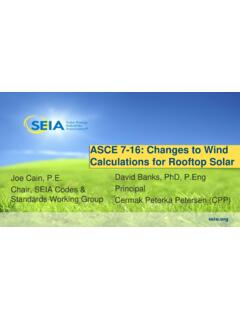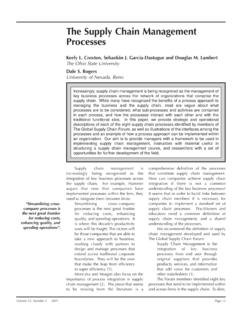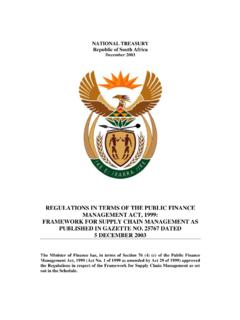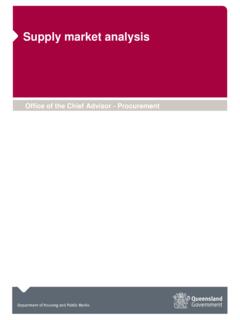Transcription of SOLAR SUPPLY CHAIN TRACEABILITY PROTOCOL 1
1 SOLAR SUPPLY CHAIN TRACEABILITY PROTOCOL INDUSTRY GUIDANCE April 2021 SOLAR SUPPLY CHAIN TRACEABILITY PROTOCOL 2 FOREWORD The ability to trace the provenance of components through the SUPPLY CHAIN , from input materials to the finished product, is necessary and important for a variety of reasons. From upholding corporate social responsibility principles to quality assurance and environmental performance, robust product TRACEABILITY provides openness and transparency. The SOLAR energy industry delivers sustainability solutions to customers by producing energy with low greenhouse gas impacts, improving energy security, and creating jobs and economic development.
2 These considerations, however, are only part of the industry s role in sustainability. More broadly, the SOLAR energy industry has a responsibility to mitigate and manage its full range of social and environmental impacts, which include respecting the human rights of workers, ensuring that the rights of communities and other stakeholders are respected, and making business operations safe and environmentally responsible. To help meet these obligations, in 2013, SEIA launched the SOLAR Industry Commitment to Environmental & Social Responsibility ( SOLAR Commitment).
3 The SOLAR Commitment, developed through a multi-stakeholder process, is an industry code of conduct which defines common practices and expectations for environmental, health, and safety issues and related management systems. A key principle of the SOLAR Commitment is transparency. In this context, the government has identified forced labor as an area of concern for the SOLAR SUPPLY CHAIN . SOLAR customers are also increasingly seeking assurances that the products they purchase are truly sustainable, , free of forced labor.
4 To address these concerns and building upon the industry s existing corporate social responsibility platform SEIA has developed this SOLAR SUPPLY CHAIN TRACEABILITY PROTOCOL ( PROTOCOL ). The PROTOCOL is a set of recommended policies and procedures designed to (i) identify the source of a product s material inputs, and (ii) trace the movement of these inputs throughout the SUPPLY CHAIN . By implementing the key principles of the PROTOCOL , companies are better able to meet their import compliance obligations and provide customers SUPPLY CHAIN transparency.
5 The PROTOCOL also incorporates an independent, third-party audit mechanism to measure a company s implementation of TRACEABILITY policies and procedures. SOLAR SUPPLY CHAIN TRACEABILITY PROTOCOL 3 TABLE OF CONTENTS FOREWORD .. 2 TABLE OF CONTENTS .. 3 INTRODUCTION .. 6 1. SCOPE ..7 2. TERMS AND DEFINITIONS ..7 3. PRINCIPLES OF TRANSPARENCY IN THE SUPPLY CHAIN ..7 GENERAL THEMES: TRANSPARENCY, ACCESSIBILITY, RESPONSIVENESS .. 7 CORE ATTRIBUTES .. 8 DRIVERS FOR TRANSPARENCY IN THE SUPPLY CHAIN ..10 ORGANIZATIONAL SPECIFICITY.
6 11 MANAGEMENT OF TRANSPARENCY IN THE SUPPLY CHAIN ..12 RELATIONSHIP BETWEEN PRODUCT TRACEABILITY AND MANAGEMENT SYSTEMS ..13 4. INTEGRATION OF TRANSPARENCY INTO MANAGEMENT SYSTEMS .. 13 CONTEXT ..13 STAKEHOLDER ENGAGEMENT ..13 MANAGEMENT SYSTEM SCOPE ..13 LEADERSHIP AND ACCOUNTABILITY ..13 PLANNING ..14 RESOURCES ..14 COMPETENCIES ..14 AWARENESS ..14 COMMUNICATION ..14 DOCUMENTATION ..14 PERFORMANCE EVALUATION ..15 GRIEVANCE 5. INTEGRATION OF TRANSPARENCY INTO OPERATIONAL PROCESSES .. 16 PRODUCT DEVELOPMENT.
7 16 SUPPLY CHAIN MAPPING ..16 PROCUREMENT PROCESS ..18 SUPPLIERS RELATIONSHIP MANAGEMENT ..18 SOLAR SUPPLY CHAIN TRACEABILITY PROTOCOL 4 PRODUCTION CONTROL ..19 RELEASE OF PRODUCTS ..21 6. REFERENCES .. 21 ANNEX A: APPLICATION OF THE PROTOCOL TO THE SOLAR MODULE SUPPLY CHAIN ..22 1. RECOMMENDED DOCUMENTATION .. 22 1. METALLURGICAL GRADE SILICON .. 23 2. POLYSILICON .. 23 3. SOLAR WAFER .. 24 4. SOLAR CELL .. 24 5. SOLAR MODULE .. 25 ANNEX B: GUIDANCE ON RISK 6. RISK FACTORS .. 27 7. RISK MANAGEMENT 27 8.
8 RISK MANAGEMENT 28 9. RISK 28 10. ANALYSIS AND EVALUATION .. 29 11. RISK TREATMENT .. 29 ANNEX C: GUIDANCE ON DUE 1. DUE DILIGENCE PRINCIPLES .. 30 CHARACTERISTICS OF DUE DILIGENCE ..30 DUE DILIGENCE FOCUS AREAS ..31 RISK 2. ROLES AND RESPONSIBILITIES .. 32 LEADERSHIP ..32 3. DUE DILIGENCE PLANNING .. 32 GENERAL ..32 ESTABLISHING A DUE DILIGENCE PROGRAM ..32 SCOPE OF THE DUE DILIGENCE ..33 DUE DILIGENCE CYCLE ..33 DILIGENCE PROCESS DESIGN ..33 4. SUPPORT .. 33 RESOURCES ..33 SOLAR SUPPLY CHAIN TRACEABILITY PROTOCOL 5 COMPETENCIES.
9 33 COMMUNICATION ..34 DOCUMENTATION ..35 5. IMPLEMENTATION OF THE DUE DILIGENCE PROGRAM .. 35 OVERVIEW OF DUE DILIGENCE PROCESS ..35 DUE DILIGENCE ACTIVITIES CYCLE ..35 6. DUE DILIGENCE PERFORMANCE EVALUATION .. 38 7. SOCIAL COMPLIANCE 39 POLICIES AND PRACTICES ..39 SOCIAL COMPLIANCE DUE DILIGENCE DOCUMENTS ..39 8. REASONABLE CARE .. 39 9. CONTINUOUS IMPROVEMENT .. 40 GENERAL ..40 SOLAR SUPPLY CHAIN TRACEABILITY PROTOCOL 6 INTRODUCTION Transparency of SUPPLY chains is paramount. Equipment purchasers, electricity end-users, and other stakeholders demand transparency for reasons ranging from sustainability to corporate social responsibility to import compliance.
10 In this environment, manufacturers must have the proper systems in place to meet stakeholder needs and build trust. To assist the industry, SEIA, with the support of Clean Energy Associates (CEA) and Senergy Technical Services (STS), has developed this SOLAR SUPPLY CHAIN TRACEABILITY PROTOCOL ( PROTOCOL ) to help manufacturers and importers demonstrate the provenance of their products by developing and implementing a TRACEABILITY program consistent with the general principles herein. The PROTOCOL is organized into three primary sections: (i) Principles of Transparency; (ii) Integration of Transparency into Management Systems; and (iii) Integration of Transparency into Operational Processes.












